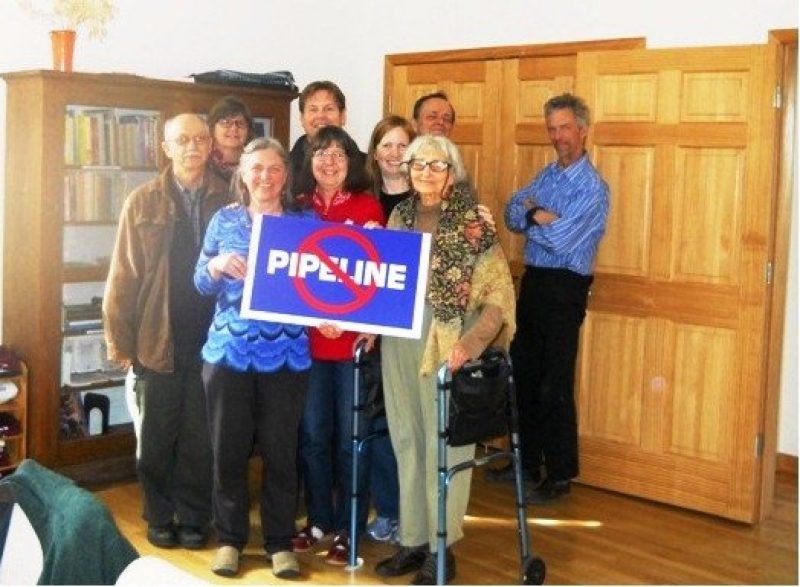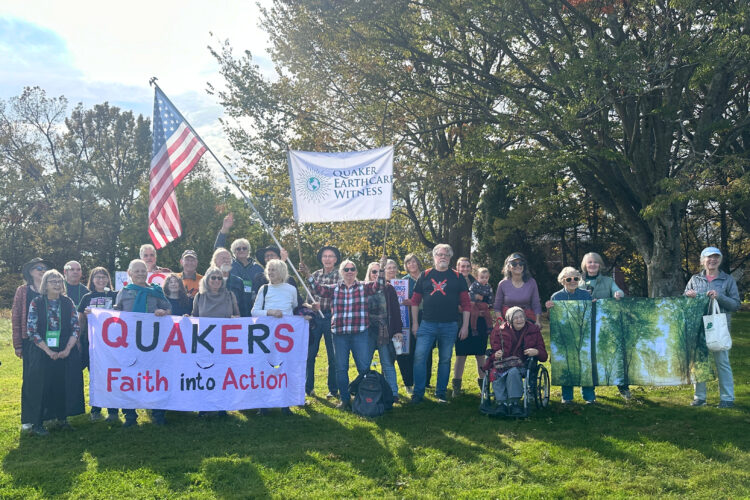Thinking Globally, Acting Locally: Against the Mountain Valley Pipeline

By Vicki Tolbert
As a member of the Blacksburg, VA Friends Earthcare Committee reminded us, we have been “thinking globally, acting locally” as we take on a global issue confronting our local area: the proposed Mountain Valley Pipeline.
Appalachia has historically been a target for those seeking to make a profit from its natural resources, including virgin forests and coal. History is appearing to repeat itself as energy industry interests are pursuing permits to build a pipeline. The purpose of this pipeline is to transport natural gas derived from the Marcellus Shale field through the process of hydraulic fracturing.
The long-term disastrous environmental hazards of obtaining natural gas through hydraulic fracturing and horizontal drilling have been exposed and protested by many environmentally conscious groups. However, further environmental devastation is probable if high-pressure gas transmission pipelines for such dangerously produced fossil fuel are permitted to be constructed and used.
The geological profile of our area includes many sinkholes and caves common to such karst regions. The 42-inch pipeline being proposed is larger than the prior 20-inch to 32-inch gas pipelines that have previously been proposed or built by the specific contractors who are seeking permits from the Federal Energy Regulatory Commission. The pipeline is planned to follow powerlines, thus exposing electrical equipment to possible gas explosions and fires.
Requests to survey in the Jefferson National Forest have been made by the pipeline contractors. Building the pipeline will decimate natural areas including waterways, exposing them to invasive species, and destroying natural habitats through disruption and contamination.
Further, toxicity will result from the proposed compressor stations that pressurize gas to move through the pipelines. Per an educational flyer from preservemontgomerycountyva.org and preserverthenrv.com, “Compressor stations release materials that can cause cancer, worsen asthma, cause serious respiratory illness, and increase deaths from heart disease. Other major damage can occur in the kidney, liver, nervous system, bone marrow, and fetal development.” Also, “blowdowns (pressure releases) release natural gas containing methane into the atmosphere. The process happens frequently and can last up to 3 hours. They can be scheduled or accidental. It is the largest single emission at a compressor station.” This flyer lists prominent chemical, noise, and light pollution that will be emitted from the stations and notes that “there have been 10 fires/explosions in the past 4 years.”
There are many obstacles to overcome in order to stop the construction of the Mountain Valley Pipeline. Some of these hurdles are eminent domain legal issues, support of elections of political officials by energy companies, and myths such as job creation and U.S. freedom from foreign-sourced fossil fuels. Often, jobs created by construction of such projects are temporary jobs that involve digging ditches and putting up fences. We have heard that there are plans to export the extracted natural gas.
Our Earthcare Committee is continually striving to become educated and subsequently pass that knowledge to our Blacksburg Friends Meeting through announcements and informative community events held at our meeting house. One early event combined presentations by anti-Pipeline experts and excerpts from the documentary, A Fierce Green Fire, which chronicled many historical environmental battles. Members of our committee are active participants in organizations that are solely involved in preventing the Mountain Valley Pipeline from becoming a reality. One of our Earthcare Committee members took part in the recent Climate Change demonstration held in D.C. during the visit of Pope Francis.
Through many doing what they can, perhaps the Mountain Valley Pipeline, along with the Keystone XL Pipeline and the Atlantic Coast Pipeline, can be stopped from being constructed. Without having a transportation infrastructure for fossil fuels, the profit-seeking energy industry may be more willing to seek environmentally sustainable energy sources, cease the disastrous practice of fracking, and encourage conservation.

